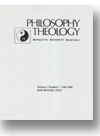|
articles |
|
1.
|
Philosophy and Theology:
Volume >
2 >
Issue: 2
Dale M. Schlitt
John E. Smith on Experience
abstract |
view |
rights & permissions
| cited by
In this study I propose that John E. Smith’s years-long argument for the importance of, and indeed his prolonged focus on, the notion of experience provides a particularly useful point of entry into the classical North American philosophical tradition and specifically into more pragmatist understandings of experience. Thisstudy of Smith on experience will proceed in three steps. After a brief reference in Part One to the Roycean background and context to Smith’s efforts toward a more adequate understanding of experience, it will continue in Part Two with a review of the three-stage development of Smith’s own transformation, in a more distinctly pragmatist direction, of Royce’s idealist-pragmatist notion of experience as interpretation. This review of Smith’s thought lays the groundwork for a suggestion, in Part three of this study, toward the continuing formulation of a more explicitly developed philosophy of experience. The basic proposal will be to affirm the need, while profiting from Smith’s important contributions, to pay renewed attention to more idealist concerns for structure and totality.
|
|
|
|
|
2.
|
Philosophy and Theology:
Volume >
2 >
Issue: 2
Roland J. Teske
The De Libero Arbitrio & Proof for God’s Existence
abstract |
view |
rights & permissions
| cited by
The heart of Book Two of De Iibero arbitrio is devoted to a lengthy argument that concludes that God is and is truly and sovereignly. This argument rests upon two crucial principia that have been called the principles of subordination and participation. An examination of their function in the argument reveals that Augustine could hardly have thought that he had produced a demonstration of God’s existence.
|
|
|
|
|
3.
|
Philosophy and Theology:
Volume >
2 >
Issue: 2
Robert Hurd
The Impiety of Thinking
abstract |
view |
rights & permissions
| cited by
This study is divided into three parts. In the first I survey various incidents in which the oscillating friend/foe pattern between philosophy and religious consciousness is played out, and seek to determine the nature of this alternating complicity and conflict. In the second part, the implications of attributing a posture to thinking are examined. Here I argue that human thought always occurs within, and is shaped by, a fundamental will and feeling toward reality. In the third part I argue that rational consciousness has a structural tension built into it: the tension between acknowledgement and conformity to the other and assertion and enactment of the self.
|
|
|
|
|
4.
|
Philosophy and Theology:
Volume >
2 >
Issue: 2
Margaret Craddock Huff
The Interdependent Self:
An Integrated Concept From Feminist Theology and Feminist Psychology
abstract |
view |
rights & permissions
| cited by
Women have been stigmatized in androrentric psychology by a deficiency model and in patriarchal theology by a domination model. Neither health nor whoIeness has been available to women in these frameworks. Feminist liberation theologians have posited alternative views of the human which take women’s experience seriously. Similarly, the “self-in-relation” approach to women’s development being proposed by feminist psychotherapists centers on women’s experience as normative for women. These two discussions of what it means to be a female converge in many dimensions. One such convergence, a growth-enhancing relationship, is explored in some depth for its applicability to a feminist pastoral counseling.
|
|
|
|
|
5.
|
Philosophy and Theology:
Volume >
2 >
Issue: 2
William J. Prior
Compassion:
A Critique of Moral Rationalism
abstract |
view |
rights & permissions
| cited by
In the first part of this paper, I argue that the sentiment of compassion is a factor of the first importance in moral theory. This sentiment, which causes us to act well toward persons in need, is an essential element in the psychology of the morally well-developed person. Moral rationalists such as Epictetus and Kant, who contend that the source of moral value is reason rather than compassion, produce a distorted picture of our moral lives. Hume’s moral psychology gives compassion the place it deserves as a motivating factor in moral action.In the second part of the paper, I study the impact of moral rationalism, as manifested in the work of Peter Singer, on the question of the treatment of mentally handicapped humans. Singer’s advocacy of euthanasia for such people is a consequence of his adoption of rationalist assumptions about the value of human life, and shows the unacceptable implications of those assumptions.
|
|
|
|
|
6.
|
Philosophy and Theology:
Volume >
2 >
Issue: 2
Andrew Tallon
Editor’s Page
view |
rights & permissions
| cited by
|
|
|
|
